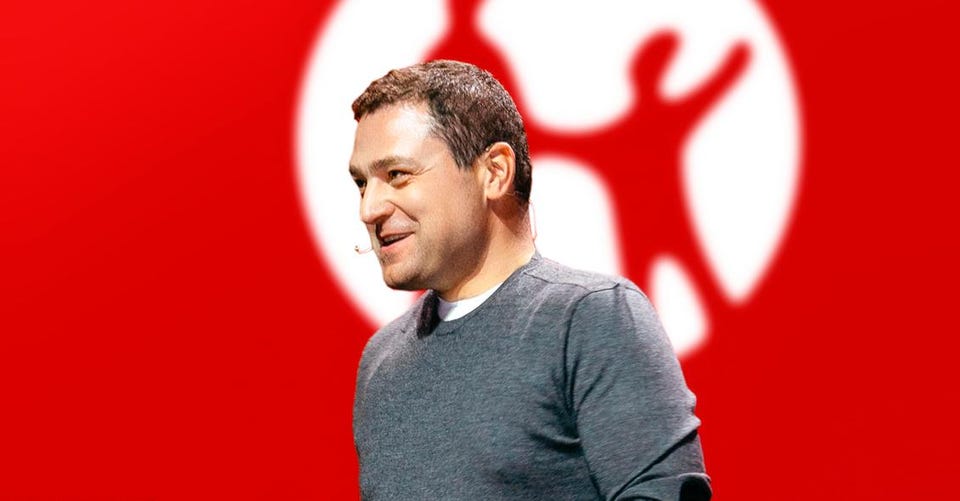Last month, Kaspi.kv, the retail and fintech unicorn from Kazakhstan, made headlines around the world after a successful IPO on the London Stock Exchange at a $6 billion dollar valuation. It was celebrated as the largest international tech IPO in London of 2020.

But Kaspi is not a traditional tech startup with hungry, disruptive founders and hard driving investors. At the heart of Kaspi is a deal among three men and a private equity fund involving billions of dollars that–despite scrutiny from the London Stock Exchange, sponsors and regulators–raises a whole host of questions.
The two most important players at Kaspi are its chairman, Vyacheslav Kim, and CEO Mikhail Lomtadze, whose respective 25% and 23% stakes are currently worth around $2 billion each. But, working alongside Moscow-based private equity fund Baring Vostok, the journey the duo took to become the largest individual shareholders of the company is filled with plot holes.
The largest of which features one Kairat Satybaldy, a former investor and the politically powerful nephew of Kazakhstan’s former president Nursultan Nazarbayev. Satybaldy claims to have walked away from Kaspi in 2018, unloading a very similar sized stake to the one now owned by Lomtadze.
The Deal
In what’s described by a Kaspi spokesperson as part of a “large transaction,” Kim spent around $390 million buying Kaspi stock in 2018. Then, according to the prospectus, he transferred shares to Lomtadze that at the time were worth an estimated $500 million, in exchange for a “certain non-cash consideration” in December 2018 “pursuant to a long-standing arrangement encompassing their various business interests.”
Added to a 9.9% stake given to Lomtadze by Kim (as part of the same “arrangement”) prior to 2017–Lomtadze was granted a total stake of 31% in Kaspi.
In 2019, Lomtadze’s ownership dropped to 29%; it appears as though he may have sold part of his holding to Goldman Sachs, which acquired a 4% slice of the company that year. Lomtadze now owns 23% of the company, according to filings, worth $2.2 billion.

In a statement to Forbes, a Kaspi spokesperson confirmed the deal, which was made between Lomtadze and Kim in 2007, but said, “It’s not correct to say that Mikhail was just given his stake.” Lomtadze “built” Kaspi, the spokesman says, adding that “it’s quite common for entrepreneurial founders to own large equity stakes in their businesses.” But Lomtadze is not a founder. He arrived at the bank that would become Kaspi as its CEO following an investment in the bank by Baring Vostok, where Lomtadze was a partner.
The spokesman for Kaspi did not explain how Kim came up with hundreds of millions of dollars to buy Kaspi shares, nor on the exact terms of the 2007 deal that made Kim and Lomtadze equal partners. Kaspi said that it couldn’t comment on Kim’s “specific financial arrangements” but added that “[t]he increase in Mikhail [Lomtadze]’s stake is due to the formalization of his partnership agreement with Vyacheslav [Kim] and not related to his annual compensation.”
Kaspi confirms that it took around 13 years—from 2007 until this year–for Kim and Lomtadze to “formalize their shareholder agreement.” It also says that because the company didn’t seek external capital or pre-IPO funding, other than an investment from Baring Vostok in 2006, there was–until now–no need to make the “agreement” formal or public.
Addressing the uncertainty about why an agreement between the pair was not made formal until “the very last moment,” Lomtadze claims in an interview conducted by a partner at PWC and published Tuesday on forbes.kz (Forbes Kazakhstan, an independent licensee of Forbes) that the two men’s relationship was one of “complete trust and chemistry.”
Kaspi Conquers Kazakhstan
Kaspi’s mobile payments and banking app is used by around half of Kazakhstan’s 18 million people—and in less than a decade, the company has helped begin weaning the country off using cash, claiming in September that daily active users of the app had increased 172% over the prior year. Kaspi says it now accounts for 68% of all electronic transactions in Kazakhstan, a payments footprint almost twice the size of all its competitors combined, including Visa and Mastercard. “People saw how easy it made their lives,” says Dr Atanu Rakshit, assistant professor of economics at Kazakhstan’s Nazarbayev University.

With close ties to Kazakhstan’s government, Kaspi has also emerged as the country’s unofficial national online bank for paying taxes and fines, assuming a role that would otherwise be filled by the civil service or a government department, and further driving new user growth across the country. It even helped distribute social benefits during the pandemic.
Revenues grew 32% to $740 million in the first half of 2020. Profits have jumped too, up 50% to $286 million, while payment transactions hit 718 million for the quarter ending September, Kaspi announced, up by 212% year-over-year, as their app quickly conquered the country during the pandemic.
Although Kaspi’s success in Kazakhstan is clear, what remains unclear is how Kaspi’s puzzling ownership changes passed muster with the powerful institutions scrutinizing Kaspi’s public listing, namely book runners Morgan Stanley, Citigroup and Renaissance Capital, the U.K.’s Financial Conduct Authority and the London Stock Exchange. The concerned parties all referred Forbes to investor relations at Kaspi.
Lomtadze, Kim And Kaspi
Kim, described in a Kaspi press release as a “mathematician and physicist by training, but an entrepreneur by calling,” found success in retail mainly through launching home electronics chain Planet Electronics, which he exited in the mid-2000’s, according to a Kaspi spokesperson, around the time Kaspi “became his principal investment.” Planet Electronics shut down in the late 2000s. Kim is also an investor and chairman of the supervisory board of supermarket group Magnum, described by a local news agency in April as the largest chain in Kazakhstan.
In 2002, Kim, who was 32 at the time, bought Kaspiyskiy—then a recently privatized bank—for an undisclosed sum. “It might have been a bit naive, but buying a bank was a big trend. Every successful entrepreneur was buying a bank, so we did too,” he was quoted as saying in a company statement in July 2019.
Lomtadze, who hails from neighboring Georgia, speaks English and is the public face of Kaspi. One of his country’s earliest free market fundamentalists, Lomtadze attended Georgia’s first ever business school before starting an auditing firm in 1995 and then hopping over the pond for Harvard Business School. He graduated in 2002, the same year he met Michael Calvey, the American founder of Baring Vostok, in New York. “I don’t need any salary,” Lomtadze says he told Calvey at their first meeting, speaking to Forbes from Almaty in early November on a video call. “I just want to work with Baring Vostok.” Lomtadze subsequently joined Baring Vostok and became a partner in 2004.
In 2006, Baring Vostok, invested an undisclosed amount in Kaspisky (bank), leading Lomtadze to join forces with Kim in 2007. They rebranded Kaspisky as Kaspi the following year. The duo has since made at least five additional investments in Kazakh businesses, including companies in bill payments, car retail, and online classifieds. By June 2020, Kim held around 31% of Kaspi, while Lomtadze held 25.9%, according to an audited financial statement.
Kairat Satybaldy
The third man with an important connection to Kaspi is Kairat Satybaldy, the nephew of Kazakhstan’s former longtime president Nursultan Nazarbayev. Often described as the son Nazarbayev never had, Satybaldy is a leading figure in the ruling Nur Otan Party, and a member of the country’s business and political elite.

Satybaldy claims to have first acquired a stake in Kaspi in 2015, and then became one of the three largest three shareholders alongside Kim and Baring Vostok. According to Kaspi’s company accounts, Satybaldy owned 30% of the firm as of December 2017, while Kim owned 21% and Baring Vostok 38%.
Satybaldy then appeared to cash out prior to Kaspi’s failed 2019 London IPO attempt. This year’s Kaspi IPO prospectus shows that between July and September 2018, Satybaldy (spelled Satybaldyuly in the document) unloaded his entire shareholding in the company through a series of sales on the Kazakhstan Stock Exchange (KASE), and completed his exit on October 1, 2018. (The company was listed on the Kazakh stock exchange but had just four main shareholders.) The prospectus shows that this is the same period during which Kim bought and “transferred” nearly 39.9 million shares to Lomtadze.
Kate Mallinson, associate fellow at London-based policy institute Chatham House, says the movement of “one stake from one shareholder to another with little explanation suggests a typical Kazakh playbook [of] corporate behavior.”
Adding, “If Satybaldy’s name had been on the ownership [this year], red flags would have alerted any financial institution interested in the listing. Behind the scenes, the extended Nazarbayev family own most of the banking sector and Kairat [Satybaldy] is one of the most influential economic actors.”
Despite stepping down as Kazakhstan’s president in 2019, Nazarbayev remains the single biggest source of political and economic power in the country, says Mallinson, describing Satybaldy as a “trusted nephew” of Nazarbayev and “one of the most powerful players behind the scenes in Kazakh elite politics.” In other words, Satybaldy is a politically exposed person and would have drawn scrutiny from regulators if he remained a controlling shareholder ahead of the IPO.

Dosym Satpayev, a director of the Risk Assessment Group, an Almaty-based consultancy firm, says that the “point of view” among geopolitical analysts in Kazakhstan is that “the departure of Kairat Satybaldy from Kaspi Bank was formal and is precisely connected with the IPO, since the presence of Kairat Satybaldy among the bank’s shareholders could negatively affect the bank’s reputation during the IPO.”
Satpayev suggests, “Kairat Satybaldy transferred (or sold) his shares to other shareholders” and these shareholders “may” have “entered into a safe agreement with him that, as nominal owners of the asset, they will take into account his interests and return the shares upon demand to the true owner.”
Satpayev suggests that Satybaldy could become a shareholder of Kaspi again, using an offshore entity to do so. Satybaldy could not be reached for comment. The Kazakhstan embassy in London described Satybaldy as a “private citizen” and referred Forbes to direct inquiries to Kaspi.
A Kaspi spokesperson tells Forbes that Satybaldy was a “financial investor with no direct involvement in the company” and has “no connection in any capacity with the company now.” Satybaldy was reported by a Kazakhstan news website in April 2019 as stating that his “investment strategy” is to “invest for three years on average” and he “fully exited from Kaspi.kz, selling my stake to the company and other shareholders” in 2018.
Kaspi has long maintained an open dialogue with top politicians in Kazakhstan and Kim once served as an advisor to the prime minister. “In emerging markets, everything is relationship-driven,” he said in 2019, speaking about Kaspi’s private-public position in a company statement. With such a connection to the political center in Kazakhstan, it remains possible that Satybaldy has not completely stepped away from Kaspi, although Kaspi refutes this allegation.
Original source of article : FORBES